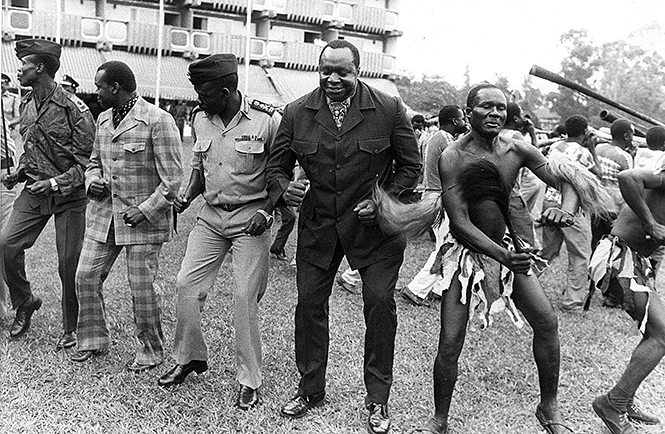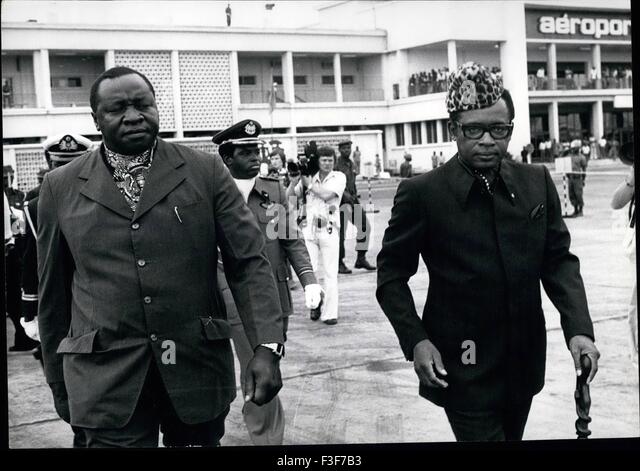The Last King of Scotland
“We will build a land of gold above the savannah. Allah has decreed it, and I shall carry out His will.”
-Idi Amin-
If there was any person in the world that matched the stereotype of third world megalomaniacal dictator, it was Generalissimo, and President for Life Idi Amin of Uganda (he would hold fifteen other titles, mostly those he styled himself with the consent of the Ugandan legislature). Brought to power in a US/UK/Israeli-backed coup in 1970, the former commander of the Ugandan Armed Forces didn’t waste time in turning his impoverished nation into his personal fief. Well known for his fondness of the pleasures of the flesh – a notorious bigamist with five wives – a significant portion of the nation’s treasury was emptied as he constructed numerous mansions and imported countless luxury goods for the use of himself and his inner circle.
However, as chronicled by Idi Amin’s close friend and confidant Bob Astles, Amin’s trajectory was changed by a dream he had in May 1973. Amin would confide to Astles about what had happened the next day – in the dream, Amin said Allah himself had descended from the heavens in the form of a massive storm to inform Amin of his destiny. Namely to build an African empire with Uganda at its heart. Astles, as any European would be, was both intrigued and just a little bit frightened at Amin’s apparent determination to bring about the result. He would later state that had he not used his influence over the African potentate then the history of Africa would have been far darker than the way it turned out to be.
The inner circle of Uganda’s leaders, Astles among them despite the fact he did not hold Ugandan citizenship (Amin would grant him citizenship ten years later), met with Amin at the latter’s Lake Victoria country mansion. In it, a plan was put together to pull Uganda into the modern world. Amin’s dream was to transform the country, to turn Entebbe into “The jewel of Africa. The New York City of our Continent,” while Kampala and the other Ugandan cities would be the “Detroit, Pittsburgh, and Chicago of Africa, the industrial heart.” The plan, dubbed the “Industrial Plan,” consisted of three policies. First was Amin’s opening up of Uganda’s natural resources to foreign export. While he did not wish to grant foreign entities such concessions, Astles would recall that Amin knew that Uganda needed massive infusions of capital to stand on its own two feet. Second was luring in foreign minds and experts into the nation using vast grants of money, land, and perks. Tens of thousands of experts from the US and Europe would end up making the journey, as did many Indians – joining the large South Asian community already there – to assist in creating a modern state out of the impoverished former colony. Thirdly, government construction crews descended on the main cities, vowing to turn the decrepit slums into vibrant urban centers. These were long term solutions for the most part, but Amin was content to wait.
Uganda was a small, landlocked nation. Amin knew this, and aimed to change this by expanding his reach toward creating a regional alliance of similar-minded nations. Tanzania, Communist Ethiopia, and Kenya were all ruled by hostile powers, so Amin focused his initial outreach to the giant to his west. Zaire.
President Mobutu Sese Seko was much like Amin, a self-aggrandizing potentate that sought to rid his nation of colonial influence while also accumulating wealth. However, in the face of continued dependence on the west and a simmering rebellion in the form of the Soviet-aligned Laurent Kabila, the overtures from Amin to meet in Entebbe were accepted. Inviting newly-minted Angolan President Jonas Savimbi to the 1974 summit, over fine wine and whole roasted gazelles, the three leaders discussed the creation of a united alliance against communism and colonialism (while aligned with the west for the time being). After a week, the three leaders agreed (Amin sealing the deal with a marriage between his daughter and the newly-widowed Mobutu), and the Entebbe Pact was signed to great fanfare in Kampala, Kinshasa, and Benguela.
Barely a year had passed when the Entebbe Pact was set to expand its membership by one. To the east of Uganda, President Jomo Kenyatta of Kenya stubbornly clung to power via rigged, one-party elections despite a middling socialist economy and his citizens struggling in poverty. International pressure from the west to hold an actual election finally caused Kenyatta to accede, though a smattering of bribed “opposition” candidates were likely to give him a thumping victory. Amin and Mobutu hated Kenyatta, the former’s greatest detractor and a supporter of the Ugandan exile community dedicated to overthrowing Amin.
Knowing that the military wasn’t equipped to fight Kenya at this point, Amin and his allies in the South African intelligence agencies devised a plan. There was a popular figure in Kenya, someone that could take on Kenyatta and win – former Minister and anti-colonial activist Barack Obama Sr. Convinced to run, Obama brought in a robust operation to fight for votes everywhere, attacking Kenyatta for massive poverty and pervasive theft from the people. Kenyatta reportedly considered having Obama killed surreptitiously, but a note from Amin, Mobutu, Savimbi, and the nuclear-armed B.J. Vorster that Obama’s death would mean war squashed that idea.
Hailing from a continent not known for respecting election results – apart from South Africa, Rhodesia, and the Portuguese Government-in-exile – Obama and his allies within Kenya did not seek to rest on their laurels after the decisive victory. Massive bribes provided by Amin, Mobutu, and the South African Government brought the military and mass media apparatus onto Obama’s side, leading a cadre of top generals to arrive at the Presidential palace and “advise” Kenyatta to hand over power to the victor. Realizing he had no support to stay in control, the long-time dictator acceded and allowed Obama to assume power, heading off to Italy not long afterwards. As his first action in office, Obama invited Amin, Mobutu, and Savimbi to Nairobi to sign the Entebbe Treaty.
An interesting dynamic played out in the early days of Obama’s Presidency. Knowledge arrived that his ex-wife, the American-born Ann Dunham, had died in a triple car pileup on a busy Honolulu thoroughfare with her husband, their children, and her parents. With the fact that Obama’s son with Dunham was almost a complete orphan, Hawaiian Senator Hiram Fong personally impleaded with the Kenyan leader to provide the poor boy with a home.
After sending his personal secretary to Hawaii to speak with the boy, upon hearing about his intelligence Obama acquiesced. Fourteen year old Barack Obama Jr. was placed on a plane to Nairobi the following day. His father, after getting to know him, would take young Barack Jr. under his wing as his future successor – securing a placement in the finest private school in New York City for the new first child of Kenya (Obama Sr. would have other children, but none that he valued more than his namesake).
-------------------------
By the late seventies, the Entebbe Pact had transformed themselves into a sizable player for regional hegemony. The industrialization of Kampala, Nansana, Nairobi, Mombasa, Kinshasa, Lubumbashi, Kisangani, Benguela, and Huambo were continuing at a break necked pace. Backed up by foreign advisors and equipment (Israeli and British for Uganda, and West German and American for Zaire), the militaries for the two strongest members were forming into a core of professionals as opposed to the mass of thugs and conscripts that most African nations utilized. As such, Amin and Mobutu desired a quick military campaign to flex their muscles and calm any dissent in their nations. One would present itself in September 1977.
After Obama took power in Kenya, the main opposition to the Entebbe Pact in the region shifted to Tanzania. Led by the pro-Soviet President Julius Nyerere, it was a jump off point for support to communist rebels against Amin, Mobutu, and Obama in addition to providing influence to the dictatorships of Juvenal Habyarimana and Michel Micombero in Rwanda and Burundi. Amin hated Nyerere, and was itching to declare war on Tanzania. Thanks to his relations with Mobutu and the South African desire to eliminate Tanzania as a supporter of Mozambique and the ANC opposition forces, Uganda would have important backing in their venture.
Given that Tanzania relayed military aid to the communist forces of Laurent Kabila in Zaire, Mobutu used a cross border incident between Zairean forces and Rwandan border guards (the Zaireans were pursuing Kabilist guerillas over the border) as a
casus belli to demand Habyarimana to allow Entebbe Pact forces to root out Kabila’s forces. Habyarimana refused, and on October 30th Uganda and Zaire declared war on Rwanda, Burundi, and Tanzania. Prepared armored forces launched a devastating blitzkrieg that inflicted a heavy defeat on the prepared positions over the space of three months, easily gaining air superiority.
Having taken massive losses to the Entebbe Pact juggernaut, Rwandan-Tanzanian forces made a final stand at Kigali. Habyarimana declared his capitol city a fortress, civilians impressed at gunpoint to fortify it to the hilt. Their generals advising them that going in would likely spell defeat, given that the majority of their best troops were needed to annihilate the Tanzanian main forces south of Lake Victoria – which they would do at the Battle of Mwanza on March 1st and the Battle of Shinyanga on March 21st – Amin and Mobutu ordered the city to be surrounded and pummeled with artillery and airstrikes. For two weeks the bombardment continued without abatement, Kigali turned into an approximation of hell. Just as the Zairean 2nd Armored Brigade was about to link up with elements of the Ugandan 5th Mechanized Division to cut off the city, Habyarimana had enough. Knowing he was likely to be shot by Amin, he decided to switch sides. Having met the two before, the wily Hutu banked on their desire to finish off Tanzania and their pragmatism. As long as one was loyal, he would be well treated.
On February 7th, 1978, Amin proved Habyarimana right. Rwanda surrendered unconditionally, the Entebbe Pact spared having to bleed themselves white trying to take Kigali. While a few troublemakers were executed to please their Tutsi allies, Amin was gracious to those that switched sides. Kigali and the other Rwandan cities were geared up for reconstruction under Amin’s industry initiative, Habyarimana appointed as a senior Minister in the Ugandan Government for his newfound loyalty.
With the Tanzanian military defeated decisively again and again, and Barack Obama Sr. mobilizing Kenyan forces on the northern border, the bottom fell out once Habyarimana capitulated and switched sides. A South African-supported military junta overthrew Nyerere’s government, the President forced to flee to the Soviet embassy and seek asylum from Semichastny. Once Burundi fell to the Zairean advance, terms were sent. Backed to the hilt by Andries Treurnicht, Tanzania left the bargaining table in Nairobi without losing much. Kagera province joined Rwanda in being annexed by Uganda, while Zaire annexed Burundi. Amin and Mobutu’s gamble had worked, their military muscle flexed in one of the most decisive campaigns in modern Africa. No one could ever underestimate them again, and the west cheered due to Tanzania tumbling from the Soviet bloc to theirs.
Decades later, declassified documents would uncover the actual motive for the Rwandan War. While both Mobutu and Amin sought to defeat Nyerere’s Tanzania, both had wished to wait a few more years for their military strength to increase enough for there to be less of a risk. However, in July 1977 reports arrived in Kinshasa about a new and baffling disease spreading in the northeastern portion of Zaire. Doctors were dispatched, and reported back to the government of strange symptoms of immunodeficiency only previously seen in chimpanzees by primate researchers.
Informed by his ministers that the only reason the disease hadn’t turned into a pandemic was the terrible travel conditions of rural Zaire. Not wanting to have his reputation ruined by being the one who let the world descend into a new Black Death, he nevertheless understood that the measures to prevent it would be condemned the world over. Thus, conferring with Amin, Mobutu determined that a powerful distraction was needed – and the Rwandan War was born. Proclaiming martial law in the region to “Stamp out the communist tyranny of Kabila and his cabal,” Zairian Army units and health “decontamination” teams descended into the villages. After a year of operations, further incidents of the mysterious disease ended by 1980, though nearly 300,000 civilians had been killed in the elimination sweeps conducted by the military, leaving much of the northeast depopulated. Mobutu considered it worth the risk.
In any case, Amin, Mobutu, Savimbi, and Obama Sr. found themselves leading formerly impoverished countries into contention for control of all of Africa. Immense international intention was directed towards them, namely through media friendly events such as conservation efforts for Africa’s iconic wildlife and the famed “Rumble in the Jungle” boxing match held in Kinshasa where Cassius Clay regained his Heavyweight Championship from Ken Norton in a rematch – all leaders of the Entebbe Pact attended. However, they were not the only emerging regional powers to stand on shaky ground in the late 1970s.


